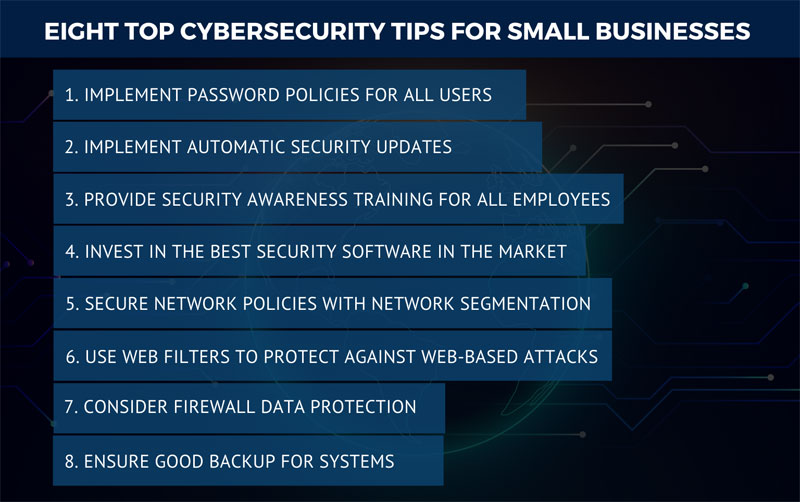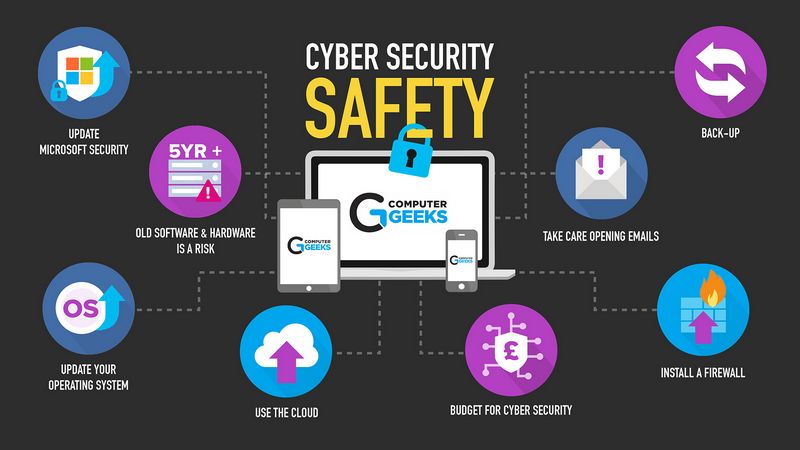
5 Security Tips For Your Business
When it comes to the safety of your business, taking preventive measures is of utmost importance. In today’s fast-paced world, cybersecurity has become a crucial aspect that every business needs to prioritize in order to safeguard their sensitive information and prevent potential threats.
Tip 1: Keep Your Software Updated
Regularly updating your software is vital to ensure optimal security. With each update, software developers fix any vulnerabilities that can be exploited by cybercriminals. By keeping your software up to date, you significantly reduce the risk of potential breaches.
Tip 2: Implement Strong Passwords and Two-Factor Authentication
Creating strong, unique passwords for all your accounts is a simple yet effective way to enhance security. Additionally, enabling two-factor authentication adds an extra layer of protection, making it harder for unauthorized individuals to gain access to your business accounts.
Tip 3: Educate Your Employees about Cybersecurity
Employees play a key role in the overall security of your business. Providing comprehensive training and raising awareness about cybersecurity best practices can help prevent potential threats caused by human error. Ensure your employees understand the importance of practicing safe online habits and staying vigilant.
Tip 4: Regularly Backup Your Data
Backing up your data on a regular basis is an essential precautionary measure. In case of a cybersecurity incident or unexpected data loss, having recent backups ensures that your business can quickly recover and minimize the impact of such events.
Tip 5: Partner with a Reliable Cybersecurity Provider
Consider partnering with a reputable cybersecurity provider to strengthen your business’s security measures. They can offer advanced solutions tailored to your specific needs and ensure round-the-clock monitoring, threat detection, and rapid incident response.
By following these essential tips, you can proactively protect your business from potential cyber threats and ensure the safety of your sensitive data. Remember, investing in robust cybersecurity measures is an investment in the long-term success and resilience of your business.
Assessing Your Security Needs
When it comes to the protection, prevention, and overall cybersecurity of your business, it’s important to assess your security needs. Every business has unique requirements and vulnerabilities, so taking the time to evaluate and address these areas is crucial for safeguarding your data and ensuring the safety of your operations.
Here are some tips to help you assess your security needs:
1. Identify your assetsStart by identifying the key assets of your business, such as customer data, intellectual property, financial records, and sensitive information. Understanding what needs to be protected is the first step towards developing effective security measures. |
2. Evaluate potential risksAssess the potential risks and threats your business may face, both internally and externally. This includes physical threats like theft or vandalism, as well as digital threats like hacking, malware, and data breaches. Conducting a thorough risk assessment will highlight areas that require immediate attention. |
3. Analyze current security measuresReview your current security measures and determine their effectiveness. Identify any gaps or weaknesses in your systems and processes that could be exploited. This includes evaluating your cybersecurity protocols, access controls, surveillance systems, and employee training programs. |
4. Stay updated with industry standardsKeep up-to-date with the latest industry standards and best practices for cybersecurity. This will help you stay ahead of potential threats and ensure that your security measures are aligned with current trends and technologies. |
5. Seek professional guidanceIf you’re unsure about how to assess your security needs or implement the necessary measures, consider seeking professional guidance. Experienced cybersecurity experts can help identify your vulnerabilities and provide you with tailored solutions to safeguard your business. |
|
Remember, protecting your business from cybersecurity threats requires a proactive approach. By assessing your security needs and implementing the right measures, you can ensure the safety of your operations and the confidentiality of your data.
Implementing Strong Passwords
One of the most important cybersecurity measures that all businesses should implement is using strong passwords. Weak or easy-to-guess passwords put your business at risk of being hacked or having sensitive information compromised.
Here are some tips for creating and implementing strong passwords:
- Choose a complex password: Use a combination of uppercase and lowercase letters, numbers, and special characters. Avoid using common words or phrases that can be easily guessed.
- Make it long: The longer the password, the harder it is to crack. Aim for a minimum of 12 characters.
- Avoid personal information: Do not use names, birthdays, or other personal information that can be easily connected to you or your business.
- Use a unique password for each account: Do not reuse passwords across different accounts. If one account is compromised, it could lead to multiple security breaches.
- Change passwords regularly: Set a schedule to change passwords on a regular basis, such as every 60 to 90 days. This further enhances the protection of your accounts.
Implementing strong passwords is a simple yet crucial prevention measure for the safety and security of your business. By following these tips, you can greatly reduce the risk of cyber attacks and protect your valuable information.
Utilizing Two-Factor Authentication
Two-Factor Authentication (2FA) is a highly recommended method to further safeguard your business against cyber threats. It adds an extra layer of security, requiring users to provide two forms of identification in order to access sensitive information or perform important actions. This additional step significantly reduces the risk of unauthorized access and enhances the overall protection of your business.
Here are some tips on how to effectively implement and utilize Two-Factor Authentication:
| 1. Enable 2FA for all accounts | Ensure that all user accounts, including employees and administrators, have 2FA enabled. This will provide an added level of protection against unauthorized access. |
| 2. Use a trusted authentication app or service | Choose a reputable 2FA solution that offers a secure and reliable authentication process. Popular options include Google Authenticator, Microsoft Authenticator, or SMS-based services. |
| 3. Implement 2FA for critical business systems | Focus on implementing 2FA for critical business systems, such as email accounts, financial platforms, or customer databases. This will provide an extra layer of protection for the most sensitive information. |
| 4. Educate employees on 2FA best practices | Provide comprehensive training to all employees on the importance of 2FA and how to properly utilize it. This will ensure that everyone understands the role they play in maintaining the security of the business. |
| 5. Regularly review and update 2FA settings | Periodically review and update your 2FA settings to ensure they align with the evolving security landscape. This includes reviewing authorized devices, disabling inactive accounts, and adopting the latest authentication methods. |
By implementing Two-Factor Authentication, you significantly enhance the overall cybersecurity of your business. Follow these tips to leverage the power of 2FA and strengthen the safety and protection of your valuable assets.
Regularly Updating Software
One of the essential security tips for protecting your business is regularly updating your software. Software updates are crucial for the safety of your business as they often include important security patches and bug fixes that can prevent potential cyber threats.
By keeping your software up to date, you can ensure that you are using the latest version with the most robust security measures. These updates are necessary to safeguard your business from vulnerabilities that hackers may exploit.
Regularly updating your software is a vital preventive measure in cybersecurity. It helps in maintaining the highest level of protection for your business and ensures that you are equipped with the latest security features.
Remember, cyber threats are continually evolving, and new vulnerabilities are discovered regularly. By regularly updating your software, you can stay one step ahead of potential attacks and minimize the risks to your business.
Key Takeaway:
Regularly updating software is one of the essential tips for protecting your business. It is a preventive measure that helps safeguard your business from cyber threats and ensures you have the latest security measures in place for protection.
Conducting Security Audits
Conducting regular security audits is an essential measure to ensure the protection and safeguarding of your business. By assessing and evaluating the security measures in place, you can identify vulnerabilities and take preventive actions to enhance your overall cybersecurity.
Here are some tips to help you conduct effective security audits:
- Define your objectives: Clearly identify the goals and objectives of your security audit. Determine what aspects of your business you want to assess and improve.
- Review existing security policies and procedures: Evaluate your current security policies and procedures to identify any gaps or weaknesses. Ensure that they are up to date and align with industry best practices.
- Perform a risk assessment: Identify your business’s vulnerabilities and potential threats. Understand the impact these risks can have on your business, and prioritize them based on their likelihood and potential impact.
- Test your security controls: Perform penetration testing and vulnerability scanning to identify any potential weaknesses in your security infrastructure. This will help you uncover any vulnerabilities that can be exploited by cybercriminals.
- Train employees: Educate your employees about the importance of security measures and the role they play in preventing cybersecurity incidents. Provide them with training and regular updates on the latest security threats and best practices.
By regularly conducting security audits and implementing the necessary improvements, you can ensure that your business is well-prepared to face potential security threats. Stay proactive and protect your business from cyber risks.
Encrypting Sensitive Data
To ensure the safety and protection of your business, it is essential to implement strong measures for encrypting sensitive data. Encryption is a crucial step in preventing unauthorized access to your confidential information and plays a significant role in maintaining the overall security of your business.
By encrypting sensitive data, you convert it into a format that is unreadable without the corresponding decryption key. This provides an additional layer of security, as even if a cybercriminal manages to gain access to your data, they will not be able to decipher the information without the encryption key.
There are several recommended tips to follow when it comes to encrypting sensitive data for your business:
- Identify the specific types of data that require encryption, such as customer information, financial records, and intellectual property.
- Use strong encryption algorithms and protocols, such as AES (Advanced Encryption Standard), to ensure robust security.
- Keep encryption keys secure by utilizing password management systems or hardware tokens.
- Regularly update and patch your encryption software to stay protected against emerging threats.
- Implement data encryption both at rest (storage) and in transit (during communication).
By following these cybersecurity tips, you can significantly enhance the security of your business and prevent unauthorized access to sensitive data. Encrypting sensitive data is an essential part of any comprehensive security strategy and should not be overlooked.
Remember, prevention is key when it comes to cybersecurity, and implementing strong encryption measures is a crucial step in safeguarding your business from potential threats.
Educating Employees on Security Best Practices
One of the most important aspects of ensuring the protection and prevention of cybersecurity threats is to educate employees on security best practices. Implementing proper safety measures and ensuring that all employees are aware of the potential risks and how to safeguard against them is crucial for the overall security of your business.
Here are some essential tips to educate your employees on security best practices:
- Regular Training: Conduct regular cybersecurity training sessions to keep your employees updated on the latest security protocols and best practices. This will help them understand the importance of cybersecurity and how to identify and prevent potential threats.
- Create Strong Passwords: Emphasize the importance of creating strong passwords and encourage employees to use unique and complex combinations. Educate them on password management tools and the need to change passwords regularly.
- Phishing Awareness: Teach employees how to identify phishing emails and other social engineering techniques. Provide examples of common phishing attempts and instruct them not to click on suspicious links or download attachments from unknown sources.
- Secure Internet Usage: Instruct employees to be cautious while using public Wi-Fi networks and to avoid accessing sensitive information when connected to unsecured networks. Encourage them to use virtual private networks (VPNs) for secure browsing.
- Update Software: Stress the importance of regularly updating operating systems and software applications. Outdated software can have vulnerabilities that cybercriminals can exploit. Remind employees to enable automatic updates or schedule regular manual updates.
By educating your employees on security best practices, you are not only strengthening the overall security of your business, but also building a culture of cybersecurity awareness and responsibility among your workforce.
Implementing a Secure Network
To ensure the protection of your business and its valuable assets, it is crucial to implement a secure network. By following these essential tips and measures, you can enhance the cybersecurity and safety of your business:
1. Use strong passwords: Set up strong and unique passwords for all your network devices, including routers, servers, and firewalls. Avoid common passwords and consider using a password manager to securely store your passwords.
2. Enable encryption: Encrypt your network traffic using protocols such as SSL/TLS. This prevents unauthorized access to sensitive information and ensures data integrity during transmission.
3. Regularly update software: Keep all your network devices and applications up to date with the latest security patches. Vulnerabilities in software can be exploited by hackers, so staying current is essential for prevention.
4. Implement a firewall: Install a robust firewall to monitor and control incoming and outgoing network traffic. This acts as a barrier between your internal network and external threats, providing an additional layer of security.
5. Train employees on cybersecurity: Educate your employees about the importance of cybersecurity and provide them with guidelines on safe browsing habits, password best practices, and recognizing phishing attempts. Human error is one of the leading causes of security breaches, so employee awareness is crucial.
By implementing these network security measures, you can significantly reduce the risk of cyber threats and protect your business from potential security breaches. Remember that cybersecurity is an ongoing process, and staying vigilant is key to maintaining the safety of your business.
Monitoring and Detecting Security Threats
Along with prevention measures, monitoring and detecting security threats is another crucial aspect of safeguarding your business and protecting it from cybersecurity risks. By actively monitoring your systems and networks, you can quickly identify any suspicious activities or potential threats before they cause significant damage.
Here are some essential tips to help you effectively monitor and detect security threats:
- Implement Intrusion Detection Systems (IDS) and Intrusion Prevention Systems (IPS): These systems can monitor network traffic, detect any unusual or suspicious patterns, and take necessary actions to prevent unauthorized access or attacks.
- Use Security Information and Event Management (SIEM) tools: SIEM tools collect, analyze, and correlate security events and logs from various sources to provide a comprehensive view of your business’s security posture. This helps in quickly identifying and responding to security incidents.
- Regularly review and analyze logs: Monitoring and analyzing logs from different systems, such as firewalls, servers, and application logs, can help identify any abnormal activities or security events that require immediate attention.
- Stay up-to-date with threat intelligence: Keep yourself informed about the latest cybersecurity threats, vulnerabilities, and attack techniques. This knowledge can help you proactively detect and mitigate potential security risks before they exploit any vulnerabilities in your systems.
- Perform regular vulnerability assessments and penetration testing: Regularly test your systems and networks for weaknesses and vulnerabilities. This allows you to uncover any potential security gaps and take appropriate measures to strengthen your defenses.
By implementing these monitoring and detection practices, you can enhance the overall safety and protection of your business from evolving cybersecurity threats.
Creating a Security Incident Response Plan
While implementing various security measures and following the essential security tips is crucial in safeguarding your business, it is equally important to have a well-defined security incident response plan in place. Such a plan helps in quick identification, containment, eradication, and recovery from security incidents.
A security incident response plan outlines the steps and procedures that need to be followed in the event of a security incident occurring. This plan ensures that all necessary actions are taken promptly, minimizing the impact of the incident on your business.
Here are some tips for creating an effective security incident response plan:
- Define Roles and Responsibilities: Clearly define the roles and responsibilities of team members involved in incident response. This includes designating a leader, establishing communication channels, and ensuring everyone understands their roles.
- Identify Potential Incidents: Identify the types of security incidents that your business could potentially face. This could include malware attacks, data breaches, network intrusions, or physical security breaches.
- Develop an Incident Classification System: Create a classification system to categorize security incidents based on their severity. This will help prioritize incident response efforts and allocate resources accordingly.
- Create an Escalation Process: Establish a clear escalation process to ensure that incidents are escalated to the appropriate personnel and management levels when necessary. This will help facilitate timely decision-making and response actions.
- Train and Test: Train your incident response team on the security incident response plan and regularly conduct drills or simulations to test its effectiveness. This will help identify any gaps or areas for improvement.
- Document Incident Response Procedures: Document step-by-step procedures for responding to different types of security incidents. Include instructions on how to handle evidence, communicate with stakeholders, and restore systems and services.
By creating a comprehensive security incident response plan, you will enhance your organization’s ability to effectively respond to and recover from security incidents. Remember, cybersecurity is an ongoing process, and having a robust incident response plan is a critical component of your overall security and protection strategy.
Stay proactive, prioritize prevention, and keep your business’s security and safety a top priority!
Applying Security Patches and Fixes
Regularly applying security patches and fixes is an essential aspect of ensuring the cybersecurity of your business. These updates help protect your systems and networks from vulnerabilities and potential breaches.
Here are some tips and measures to consider when applying security patches and fixes:
- Stay up-to-date: Keep track of the latest security patches and updates released by software vendors and apply them promptly. This includes operating systems, applications, and firmware.
- Implement a patch management system: Utilize a centralized patch management system to streamline the process of applying patches across your business’s devices and networks.
- Test patches before implementation: Before applying patches to production systems, conduct thorough testing on a non-production environment to ensure they do not cause any compatibility or functionality issues.
- Monitor vulnerability databases: Regularly check for new vulnerabilities that may affect your systems and networks. Stay informed about any patches or fixes released to address these vulnerabilities.
- Create a patch schedule: Establish a regular patching schedule that suits the needs of your business. This ensures that patches are consistently applied in a timely manner and reduces the risk of missing critical updates.
- Consider automation: Explore automation tools and technologies that can help automate the patching process, making it more efficient and reducing the chance of human error.
By applying security patches and fixes, you safeguard your business against potential security threats and reduce the risk of cyber attacks. Stay proactive and prioritize the prevention and protection of your business’s valuable assets.
Backing Up Data Regularly
In today’s digital world, protecting your business from data loss is essential. Backing up your data regularly is one of the most important measures you can take to safeguard your business against cybersecurity threats.
Here are some crucial tips to ensure the safety and security of your business data:
1. Implement a regular backup schedule: Create a backup plan that includes regular intervals for backing up your data. Whether it’s daily, weekly, or monthly, consistency is key to ensure that your data is always protected.
2. Use multiple backup methods: Don’t rely on a single backup method. Instead, utilize a combination of on-site backups, cloud storage, and off-site data storage solutions to enhance your data security.
3. Test your backups: Regularly test your backups to ensure that your data can be restored successfully if needed. This will help you identify any issues before it’s too late.
4. Encrypt your backups: Implement encryption measures to protect your backups from unauthorized access. Encryption adds an extra layer of security and ensures that even if your backup files fall into the wrong hands, they cannot be easily accessed.
5. Automate the backup process: Manual backups can be tedious and easily forgotten. Automating the backup process ensures that your data is consistently backed up without the need for manual intervention.
By following these tips, you can significantly improve your business’s data security and prevent the devastating effects of data loss.
Remember, prevention is always better than recovery when it comes to data security.
Q&A:
Why is using strong, unique passwords important for business security?
Using strong, unique passwords is important for business security because it helps prevent unauthorized access to your accounts. Weak passwords are easier to guess or crack, leaving your business vulnerable to attacks. Using different passwords for each account adds an extra layer of protection, as a breach in one account will not compromise all the others.
Can you explain two-factor authentication and why it is important for business security?
Two-factor authentication is a security measure that adds an extra layer of protection to your accounts. It requires you to provide two pieces of evidence to prove your identity – typically something you know (like a password) and something you have (like a mobile device). This helps prevent unauthorized access even if someone gets hold of your password. Implementing two-factor authentication is important for business security as it significantly reduces the risk of successful account breaches.
Why is it necessary to keep software and systems up to date for business security?
Keeping software and systems up to date is necessary for business security because updates often include security patches that address vulnerabilities. These vulnerabilities, if left unpatched, can be exploited by hackers to gain unauthorized access to your systems or data. Regularly updating your software and systems ensures that you have the latest security measures in place, minimizing the risk of security breaches.
How can training employees on security best practices improve business security?
Training employees on security best practices can improve business security by creating a security-conscious environment. Employees who are aware of common security threats and best practices are less likely to fall prey to scams or inadvertently compromise security. They will also be able to identify and report potential security risks, helping to prevent security breaches. Regular training helps reinforce security awareness and ensures employees are up to date with the latest security protocols.
What are the essential security tips for protecting my business?
The essential security tips for protecting your business include regularly updating your software and hardware, using strong passwords and multi-factor authentication, training your employees on cybersecurity best practices, implementing a firewall and antivirus software, and regularly backing up your data.







